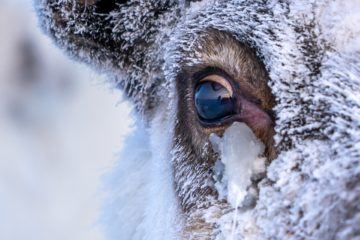by Jochen Szangolies
This is the third part of a series on dual-process psychology and its significance for our image of the world. Previous parts: 1) The Lobster and the Octopus and 2) The Dolphin and the Wasp
Rudolph, the blue-eyed reindeer

With Christmas season still twinkling in the rear view mirror, images of reindeer, most commonly in mid-flight pulling Santa’s sled, are still fresh on our minds. However, as the Christmas classic The Physics of Santa Claus helpfully points out, no known species of reindeer can, in fact, fly.
That may be so. But reindeer possess another superpower, one that sets them apart from all other known mammals—once the frosty season sets in, their eyes change color, from a deep golden-brown to a vibrant blue (to the best of my knowledge, there are, however, no reports of unusual colors related to the olfactory organs). The reason for this change of color has long been a mystery, until a study by Glen Jeffery and colleagues from the University College London pinpointed a likely reason in 2013: the change in hue serves to better collect light in the dark of winter.
When we think of eye color, we typically think of the color of the iris—but for some mammals, cats most familiarly, another factor is the tapetum lucidum, a reflective layer behind the retina. Due to its color change, reindeer eyes are able to gather more light—thus, the lack of light is offset by an increased capacity to utilize it. The world outside gets darker, but the world the reindeer see, the world they inhabit—their lifeworld, in Husserl’s terminology—may not, or at least, not as much.
The world comes to mind through the lens of the senses. The lifeworld is never just an unvarnished reality, nor even an approximation to it—it is the world as transformed in our experience. A change in this lifeworld then may herald both a change in the world, as such, as well as a change in our perception—or reception—of it. Read more »
